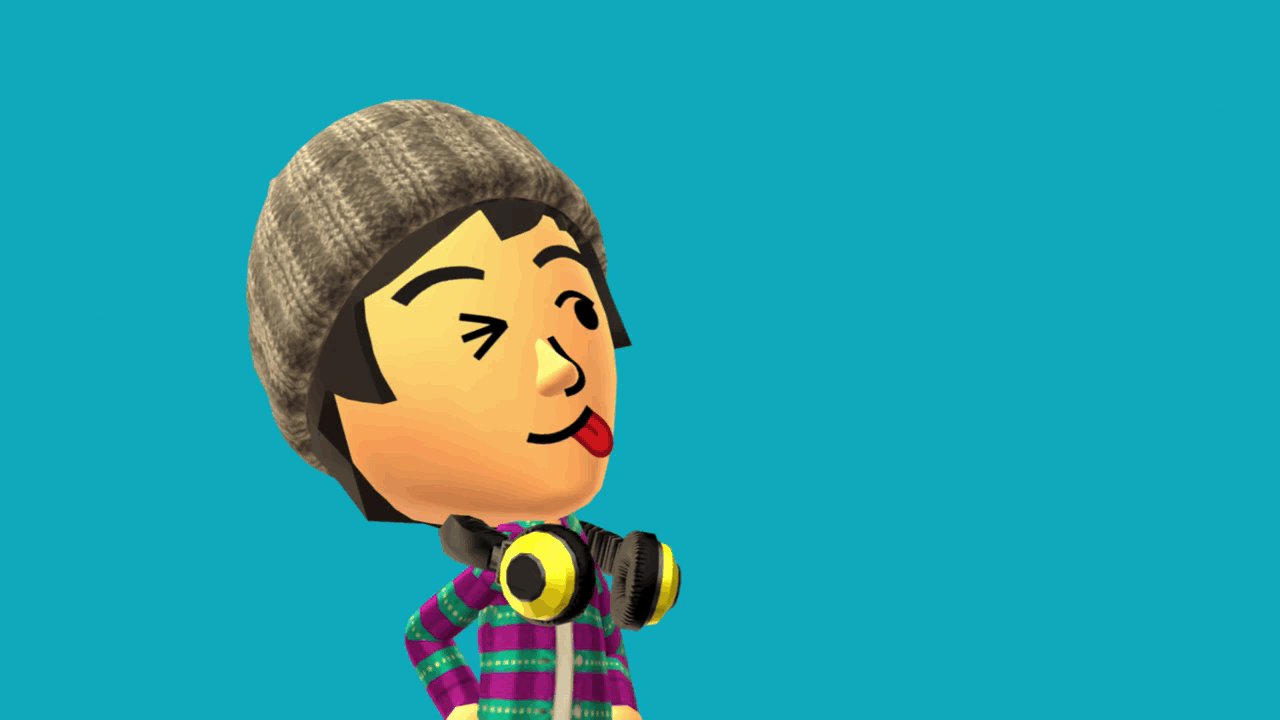The social media landscape is littered with the husks of flash-in-the-pan Facebook and Twitter competitors: Remember App.net? Ello? Probably not. How about Peach, from earlier this year? The hype for that one flamed out in just four days.
So when you see everyone signing up for this week’s anointed social app, Miitomo, your skepticism is understandable. But Miitomo has two things going for it that those other apps didn’t: It’s the first app from an upstart mobile company called Nintendo, and it’s very, very strange.
Miitomo combines the DNA of a dress-up game and a social network, but it’s not immediately clear whether the resulting app is either, neither, or both. It’s built from recognizable parts, but the end result is something new and fascinating, a bizarre marriage of cosplay, consumer psychology, and flawed utopian vision.
Nintendo seems to have built Miitomo as a friendly, secluded online space, then grafted on the commercial apparatus necessary for app store survival. The tension between those two formats results in something that doesn’t quite make sense. It’s a game without a game, a social network that’s not especially social.
In the slightly askew animated world of Miitomo, you build a Mii—an egg-shaped, cartoonish avatar—out of a limited selection of humanoid body parts. You give it a personality by quantifying five different traits (not quite psychology’s canonical Big Five, but close). Then your Mii, this personal 3D paper doll, performs its two primary functions: talking with friends and going shopping for new outfits.
The conversations take the form of brief question-and-answer sessions—something like speed dating (or, if you’re a cynic, like filling out password security questions on a corporate website).
As you answer questions and comment on your friends’ answers, you’re rewarded with gold, which you’ll immediately sacrifice to feed your burgeoning fashioning addiction. The more you interact with other players, and the more outfits you buy and try on, the more gold the game yields.
Miitomo superficially resembles social media in that it connects you with other Miitomo players and collects a lot of user data, which is what we expect social media to do. But it’s not primarily a social experience.
There is no Miitomo app platform, no set of APIs for developers, no search function to uncover people or topics. Nothing is trending. There’s no advertising, other than for in-game items.
Facebook’s proposition is: “All your friends are here.” Facebook sells your friends to you, then it sells you and your friends to other companies. But friends and conversations are almost incidental to the true appeal of Miitomo, which is playing with the Miis, trying on different outfits, and creating bizarre photo memes in the Miifoto editor (we’ll get to that soon).
Which means Miitomo doesn’t do any of the things that Facebook is betting its future on: It doesn’t drive traffic, it doesn’t offer a publishing platform where #content can be monetized, and it doesn’t do video. It also doesn’t strive to annex the entire Internet, or even a small part of it.
There is no Miitomo app platform, no set of APIs for developers, no search function to uncover people or topics. Nothing is trending. There’s no advertising, other than for in-game items. There is chat, if you decide to repurpose comments to that end, but it’s slow and clunky.
Really, that’s the most compelling thing about it as a social experience.
Life inside Nintendo’s walled garden feels refreshing after years of the stark blue and white of Facebook and Twitter. The Miis’ little apartments are bright, clean and colorful. You can dress your Mii up as a dinosaur or a gothic schoolgirl in a tomato hat. There’s peaceful, bouncy string music playing. Your uncle is not there, talking up Donald Trump and describing plans to hoard gold in a bunker.
In fact, a lot of the sociopolitical tensions that define other social networks have been flattened right out of existence in Nintendoland.
Abuse is practically nonexistent here. All interactions are opt-in; only Miis you’ve added as friends can talk to you. A dedicated harasser could track you down, but discovery on Miitomo is very limited: they’d have to be a mutual friend on Facebook, a mutual follower on Twitter, or friends with your friends on Miitomo.
And even if they do find you through the “suggested friends” list or through comments you leave on other friends’ questions, there’s a block button that will make them disappear with one click.
A lot of the sociopolitical tensions that define other social networks have been flattened right out of existence in Nintendoland.
The end result is that conversations with your friends are never interrupted by sea-lioning or a stranger’s “actually…”
There’s also no way to insert links into the game, which means there are virtually no spammers—they don’t have much incentive to advertise in Nintendoland. The truly enterprising will still find marketing opportunities; here’s a screenshot of what appears to be a camgirl using Miitomo to advertise, for example:
https://twitter.com/911VICTIM/status/716725723256512512
In a worst-case scenario, #brands will start joining Miitomo, and we’ll get to see how business entities represent themselves as rounded 3D dolls in hot dog costumes, just as God and Citizens United intended. Corporations are Miis, my friend.
But even if the Miitomo brandpocalypse does come to pass, corporate Miis would need your permission to talk to you.
Peace in Nintendoland comes at a cost, though: It’s kind of boring. The colors are vibrant, but the experience lacks texture. Harassment may have been sanded away here, but so has gender.
The safe and spherical Miis can only be male or female. There are no restrictions on what a Mii can wear or what hairstyle they can have, but there’s a double standard: Boy Miis may take off their shirts. Girl Miis may not. Facebook, after popular outcry, made “gender” a freeform text field instead of a binary menu, but out in Nintendoland, that openness is lacking.
There’s also just not much for a Mii to do. Changing clothes is fun and addictive, and certainly devoted players will remain on the hook, buying each day’s new outfits as they level their Miis into the stratosphere. But once you’re all dressed up, there’s nowhere to go—and nothing to explore.
Underneath the patina of novelty, the engine of Miitomo’s utopia is still capitalism.
To understand how a major company released a product as bizarre as Miitomo, you have to understand the landscape of madness that Nintendo has just entered: the App Store.
“Life and Death in the App Store,” Casey Newman’s eye-opening feature on the app economy, published in March by The Verge, paints a picture of a cutthroat competition where the big money flows toward just a couple of strategies.
This is the world developers live in circa 2016, according to Newman: The average app sold for a one-time payment costs a couple bucks and struggles to make money. Games make up 85 percent of app store profits, and most of them survive on in-app purchases, advertising, or some combination of the two. The average customer only uses three apps heavily—and, of the 10 most-used mobile apps, eight are made by Facebook or Google.
In other words, any app that isn’t Candy Crush, Clash of Clans, or Facebook must find a niche or face extinction.
But if games rule the app economy, why not send Mario the plumber, Nintendo’s bravest and most profitable champion, out to tame the badlands of the App Store?
Game companies that survive by peddling virtual goods have a term for their best customers, borrowed from poker slang: “whales.” They’re big fish, and the game has its hooks in them.
Nintendo ignored the mobile-phone gaming boom for as long as it possibly could, afraid of hurting sales of its own handheld consoles, but time has run out. The market dictates that even the Big N must adapt or die. Even so, the company is wary about venturing outside its proprietary consoles, and the possibility that Mario could fail on this strange new frontier was too much to bear. Analysts report that Nintendo didn’t want to risk its mascot’s reputation the first time out.
Ruling out a straightforward Mario game opened up the possibility for something like Miitomo, which feels like a studied synthesis of everything that has worked in the App Store so far: The most profitable mobile games collect your money through addictive design, hooking their players on in-app microtransactions. Facebook collects your data as the cost of interacting with your friends. Miitomo, in theory, does both.
Game companies that survive by peddling virtual goods have a term for their best customers, borrowed from poker slang: “whales.” They’re big fish, and the game has its hooks in them.
“Mobile-game ‘whales’ who spend at least $100 a month generate two-thirds of all the revenue from purchases made while playing such games,” the Wall Street Journal reported last year.
Part with 20 bucks on Miitomo and you’ll have 24,000 gold coins, enough to fill your Mii’s closet with 13 shirts, hats, or pairs of pants. So far, Nintendo has released nearly 20,000 coins worth of new outfits each day, and that doesn’t include the special items you can only win by playing a luck-dependent side game called Miitomo Drop. And many of the items come in multiple colors.
It would be very easy—not to mention treacherously expensive—to become a Miitomo whale.
If you’re grinding for the items without paying real money, it’s still fun and addictive. Saving up for a new jacket takes just long enough that it feels like a satisfying reward, but not so long it creates real frustration. In the process, you’ll have answered dozens of the game’s questions.
Reeling people in like this has become necessary to thrive in the app store, but it still feels unseemly and manipulative. It’s no surprise that Nintendo didn’t want its biggest star to dirty his shiny boots and pristine red cap in the sewer of microtransactions.
Nintendo has a history of leading players through the patterns of behavior it prescribes, dating all the way back to 1984 and the design of level 1–1 in Super Mario Bros. Over the years, that guidance has grown increasingly less subtle. Super Mario Bros. threw players right into the game and gave them everything they needed to know in the first level. Newer Nintendo games tend to rely on infantilizing tutorials and explicit hints to hammer home what the player should be doing.
Is there any intrinsic motivation to tell it where you live, what you’re doing right now, or your favorite kind of bread?
Miitomo definitely falls into the newer, instruction-heavy school of Nintendo design. Whenever you start up the app, you’re met with helpful reminders that you can gain levels by changing your Mii’s clothes and talking to friends.
But Miitomo is also Nintendo’s first mobile game, so the hand-holding instructions are there to lead the player down the well-lit path toward sharing marketable information and making in-app purchases. What purpose does gaining levels serve, after all, but to rake in more precious gold for virtual clothes? Nintendo has been planning its mobile push for some time, and has clearly been studying the dark arts of “fun pain” that rule today’s post-FarmVille app market.
But what’s the draw of Miitomo as a social experience? Is there any intrinsic motivation to tell it where you live, what you’re doing right now, or your favorite kind of bread?
Facebook and Twitter thrive because they’ve made themselves feel necessary; they’ve invoked the fear of missing out. Providing grist for the data mill feels like a fair tradeoff for something so central to our social lives.
Miitomo’s questions are supposed to be conversation-starters, and they work, to some extent. If you approach the game earnestly, you’ll probably end up chatting with friends about things you had no idea they were into. Some of those chats may even feel worthwhile—the Q&A format drills the idea of asking questions into players’ heads, and curiosity is a shortcut to better conversations.
The problem is that while Miitomo’s spirit encourages a good back-and-forth, the game’s interface design stifles it. There are no direct messages or replies, so the only way to converse in real time is by trading comments on the same answer.
If it were meant as a messaging app, Miitomo would be a failure. But that’s not why you come to Nintendoland: you’re here for other half of the app, the game half.
The marriage of chat apps and virtual goods has been a fruitful one in Japan. A fairly basic messaging service called LINE has blown up over the past couple of years by selling emoticon sticker packs, mainly featuring anime characters and cute animals, for real money. That model has led to 560 million users and an expansion into a huge, all-encompassing media and advertising platform. For Japanese celebrities and businesses, a LINE account is as obligatory as Facebook account in the U.S.
LINE has yet to break through in America, though. So it’s LINE, not Facebook, that Nintendo probably had in mind when it designed the social aspects of Miitomo, which shares LINE’s emphasis on a friendly, hyper-cute aesthetic. It also has an answer to stickers: Miifoto, a feature that lets you take custom photos of your Mii and use them as reactions in comments.
You may also find yourself sending Miitomo friend requests to people you barely know. The game incentivizes that, too: The more friends you accumulate, the more gold you get—and the sooner you can get back to shopping.
The difference is that on LINE, you buy virtual goods so you can use them to chat. In Miitomo, you chat so you can buy more virtual goods.
Because Miitomo rewards conversation with virtual gold, you may find yourself responding to questions you don’t care about. You’ll try to be playful with the prompts, responding with the funniest jokes you can think of, but you wouldn’t be taking these surveys at all if you weren’t saving up for more outfits.
If you simply had the urge to share a thought in public, you’d put it on Facebook or Twitter, where more of your friends would actually see it. But on Miitomo, the rewards for filling out surveys and reading your friends’ answers refresh each day. If you want to effectively farm Miitomo gold, you’ve got to keep coming back, keep interacting.
You may also find yourself sending Miitomo friend requests to people you barely know. The game incentivizes that, too: The more friends you accumulate, the more gold you get—and the sooner you can get back to shopping.
At its worst, Miitomo isn’t Nintendo’s Facebook, it’s Nintendo’s FarmVille—labor dressed up as play. But what can Miitomo be at its best? A place to get to know Twitter mutuals you don’t talk to in real life (while you’re both dressed as chickens or whatever), or even to learn things you didn’t know about your real friends. And to do so in a pleasant virtual environment free of ads, links, and viral trash.
It can also be a tool for the creation of artistic, comedic, and mimetic #content. The Miifoto feature allows you to pose your Mii however you want, on any background. You can make new, secondary Miis and add those to the photo. You can add text, and it’s not even censored. It’s basically a freeform app within the app.
And you can post the results on Facebook, Twitter or, yes, LINE.
As you can imagine, the one part of Miitomo that sends content outside the walled garden is highly exploitable.
https://twitter.com/PickupAstronaut/status/716009835695890432
Mmm yes, feed mii. #Miitomo #Miifoto https://t.co/GijM7HeW1r pic.twitter.com/3wbPNmRYjQ
— Omni Jacala @☁️ (@artsyomni) April 5, 2016
just another day at the office #Miitomo #Miifoto https://t.co/Xtf1z2nP6w pic.twitter.com/6T2najqX4m
— Cohen is a ghost (@skullmandible) April 5, 2016
Drinking champagne #Miitomo #Miifoto https://t.co/fOc8ImWz2F pic.twitter.com/bUxIiCQWXA
— Dan Maher (@MrPointyHead) April 3, 2016
I made my first #Miitomo #Miifoto!! https://t.co/qrvkGDxImd pic.twitter.com/VyZe80SyOb
— Kent Sheely (@ksheely) April 1, 2016
https://twitter.com/dogboner/status/716868055595257856
https://twitter.com/AlmightyBoob/status/717390672722923520
#Miitomo #Miifoto https://t.co/Bw3AExLKgp pic.twitter.com/3pCVRqEMHm
— rubber cat (@robbercat) April 5, 2016
#Miitomo #Miifoto https://t.co/l0PPlpjOjr pic.twitter.com/DxT0gt4yZS
— updating goodreads progress for graphic novel (@420WeedLord) April 4, 2016
The future of Miitomo is probably in trolling, or some future postmodern usage that teens will come up with and Nintendo never would have expected. Between Miifoto and screenshots of Miis reading your answers back to you, there might be greater possibility in subverting the game than in playing along with it.
Miitomo will be around for a while in the U.S., even after collecting outfits gets stale. Bitstrips, an app that lets you make custom comics and reaction pics in your own likeness, is so popular that Snapchat just bought it for $100 million, and the Miifoto feature has a lot more soul than Bitstrips.
Some cliques will linger in Miitomo’s sterile, brand-free utopia until the day it’s shut down, to be sure, but the customers go where their friends are, and their friends may not be on Miitomo.
If it’s not a hit, Nintendo still has the money to keep Miitomo open for years. In the long run, though, it will likely fade away, remembered as a precursor to whatever Mario game Nintendo eventually uses to crack the U.S. app store market wide open. Miitomo is a genuine oddity, and oddities in America tend to end up with dedicated cult followings, not runaway commercial success.
Some cliques will linger in Miitomo’s sterile, brand-free utopia until the day it’s shut down, to be sure, but the customers go where their friends are, and their friends may not be on Miitomo.
In Japan, meanwhile, Miitomo might be a genuine success. Three days after it launched there, it had already been downloaded a million times. LINE has proven that Japanese smartphone owners are already willing to spend big money on virtual goods. And don’t underestimate the power of collection as a game mechanic, which Japan has distilled to a fine science with franchises like Pokémon and Yokai Watch and mobile games like Neko Atsume–Kitty Collector.
Whatever happens, Miitomo is a bold experiment. Instead of trying to compete with something that already exists, it occupies its own weird space in between the major app genres. It remains to be seen whether result is something people didn’t know they wanted or something they just don’t want. Either way, Miitomo is a strange beast, and a risky and exciting thing for a major corporation to bet its mobile future on.





